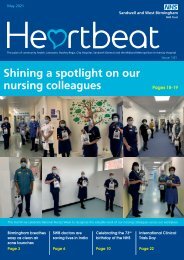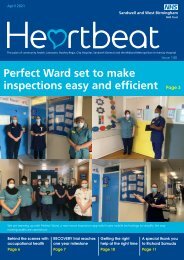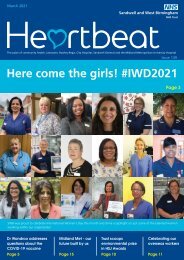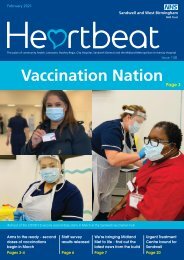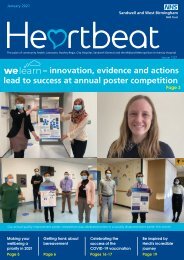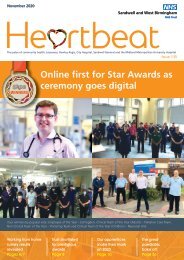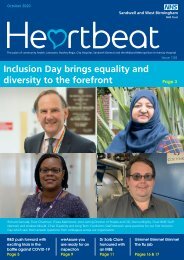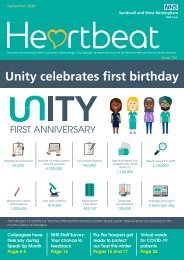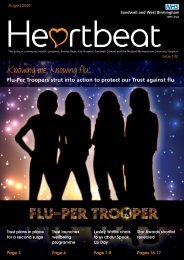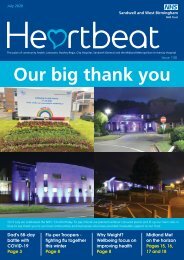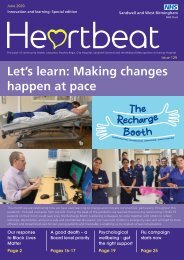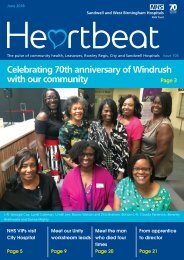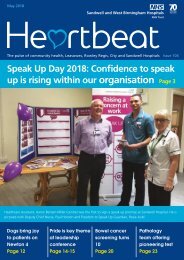Heartbeat July 2018
Create successful ePaper yourself
Turn your PDF publications into a flip-book with our unique Google optimized e-Paper software.
20<br />
Trust allergy service is first to use hay<br />
fever busting machine<br />
WOMEN AND CHILD HEALTH<br />
We have become the first NHS<br />
Trust in the UK to introduce a new<br />
device which can help combat the<br />
symptoms allergic rhinitis – more<br />
commonly known as hay fever.<br />
The Rhinolight machine, has been<br />
loaned to our paediatric allergy service<br />
by the Hungarian company that first<br />
developed it.<br />
Dr Nick Makwana first heard of the<br />
device during a conference and was<br />
interested to hear that it was used in<br />
many European countries as well as<br />
Australia, and closer to home, in Ireland<br />
but had not been used in the UK yet.<br />
The device is used to direct controlled<br />
doses of uVA, uVB and visible light up<br />
each nostril with the aim of reducing the<br />
symptoms. It zaps the cells that cause<br />
hay fever and reduces the chemicals that<br />
lead to the inflammation.<br />
It is usually administered during the<br />
hay fever season when symptoms have<br />
begun. The patient would undergo six<br />
sessions over a two week period which<br />
should lead to symptom reduction for<br />
the rest of the summer.<br />
Play Specialist, Beena Parmar helped<br />
Beena Parmar, Play Specialist, with Dr Nick<br />
Makwana and the Rhinolight Machine<br />
raise £1,100 towards the final purchase<br />
of the device through organising events<br />
through her Gujarati community.<br />
Dr Nick Makwana, Consultant Paediatrician,<br />
said: “We are very grateful to Beena for her<br />
fundraising efforts.<br />
“It means that if we can demonstrate that<br />
the device works in our young population<br />
then we will be leading the way in treating<br />
young patients who suffer from hay fever<br />
and the money raised will go towards the<br />
purchase of the Rhinolight.<br />
“This year in particular has seen a rise in<br />
the number of people showing symptoms<br />
because of the heatwave across the country,<br />
but studies have shown that this treatment<br />
works very well in tackling hay fever, and<br />
the patient will most likely be cured for the<br />
rest of the season.”<br />
Delight as we are named a birth<br />
centre beacon site<br />
Earlier this month, our organisation<br />
was named as one of three beacon<br />
sites for midwife-led birth centres<br />
by the Midwifery Unity Network,<br />
a leading UK initiative committed<br />
to women having positive birth<br />
experiences and an optimal start in<br />
life for babies.<br />
We have been named as a beacon site,<br />
alongside Lancashire Teaching Hospitals<br />
Foundation NHS Trust and Lewisham<br />
and Greenwich NHS Trust, with the<br />
announcement taking place at a national<br />
conference at City University of London.<br />
Helen Giles, Team Leader for Serenity<br />
and Halcyon Birth Centres attended the<br />
conference and was presented with a<br />
certificate by the president of the Royal<br />
College of Midwives, our very own<br />
Consultant Midwife, Kathryn Gutteridge.<br />
<strong>Heartbeat</strong> caught up with Helen to find<br />
out more about this prestigious title.<br />
Helen said: “We are privileged to care for<br />
around 1,500 women and families for their<br />
births in our midwife – led centres each<br />
year which is around 28 per cent of babies<br />
born at SWBH – the national average for<br />
England is 14 per cent so that figure is great<br />
for us, and our women and reflects the<br />
commitment of our teams.<br />
“Our facilities are some of the best in the<br />
country. We often have visitors from all over<br />
the country and indeed from abroad who<br />
visit our centres and ask for guidance to<br />
replicate our model within their own Trust.<br />
“Our motto is your birth in our home – we<br />
want to make it as inviting as possible<br />
for women and create a calm, homely<br />
environment and as less hospitalised as we<br />
can.<br />
“It was particularly pleasing to talk to a few<br />
people at the event who had visited us five<br />
years ago who came and thanked me for<br />
helping them to increase the amount of<br />
midwife led births they have.”<br />
He went on to explain how the machine<br />
works: “The probe has a special ultra-violet<br />
light mix which is inserted into the end<br />
of the nose and then changes the cells in<br />
the nose which usually trigger the allergic<br />
reaction.<br />
“There is no pain involved which is why it is<br />
a great treatment for children. This will also<br />
save money for the NHS as, if the symptoms<br />
become controlled, then there will be less<br />
visits to the GP and less prescriptions for<br />
medicines to help battle the symptoms of<br />
hay fever.”<br />
Beena, who has worked at our organisation<br />
for 21 years, said: “Every year my temple,<br />
BPM Krishna Mandir in Sparkbrook, has a<br />
chosen charity which it fundraises for.<br />
“There are many children within the<br />
Gujarati community who suffer from<br />
allergies and I wanted to raise more<br />
awareness around it, so they agreed to hold<br />
a dinner and dance in aid of our paediatrics<br />
department.<br />
“Dr Makwana visited the temple and told<br />
them that the money would go towards the<br />
Rhinolight machine.<br />
“We raised a total of £1,100 and I am so<br />
pleased that we were able to fund the<br />
purchase of this machine.<br />
“It is going to help a lot of children coming<br />
to use our service.”<br />
Birth centres share a number of important<br />
characteristics. The midwives running<br />
them want women to feel empowered<br />
and supported to give birth using their<br />
own resources. They also have an in-depth<br />
knowledge of pregnant women’s physiology<br />
and clear understanding about identifying<br />
what is a change from normal requiring<br />
intervention or involvement of our obstetric<br />
team.<br />
Kathryn, who the Midwifery Unity Network<br />
describe as a birth centre pioneer, said:<br />
“Birth centre midwives have confidence in<br />
a woman’s ability to give birth. We develop<br />
the skills and experience of midwives to<br />
build that confidence, to listen to women<br />
and to work closely with medical colleagues<br />
to ensure optimal and safe care.<br />
“I am particularly proud of our midwifeled<br />
care within this Trust and to be able<br />
to present Helen with the Beacon site<br />
certificate was a real honour for me.”




